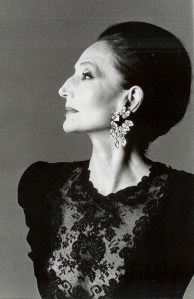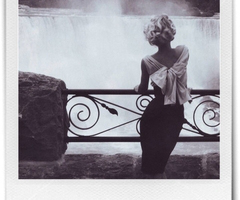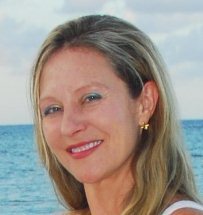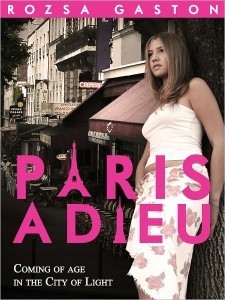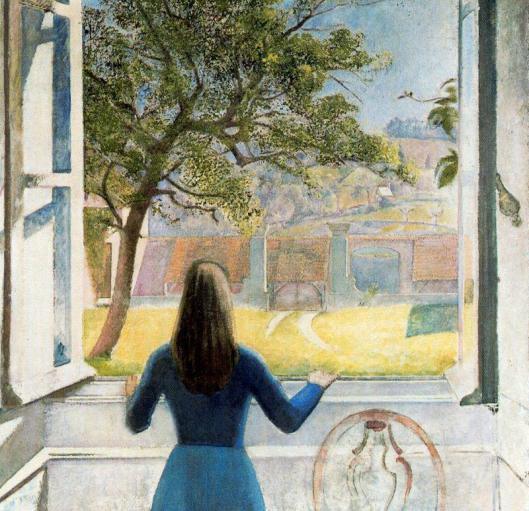Rozsa Gaston's Blog, page 5
November 30, 2012
Life beckoned and Ava rushed toward it.
Paris Adieu hit No. 1 on Amazon’s Best Sellers in Travel list yesterday. Thank you, readers. Until midnight tonight, Fri. Nov. 30, Paris Adieu Kindle Edition is downloadable FREE on amazon. US readers go to http://amzn.to/MLX194. UK readers go to http://amzn.to/TBFNfp. Wander the streets of Paris on a journey to self-discovery, dear friends.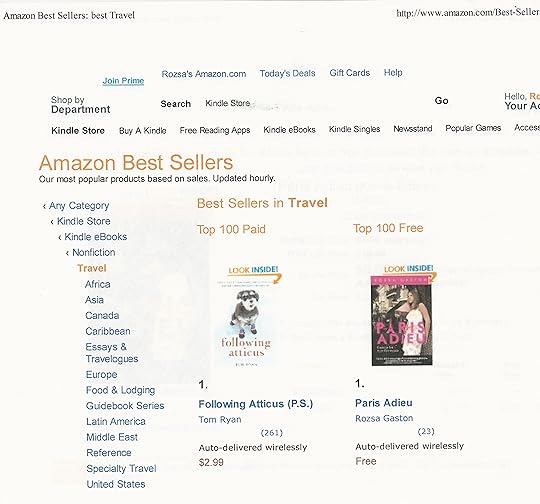
Amazon Best Sellers in Travel 11-29-12


November 14, 2012
Paris Adieu Paperback Book Giveaway
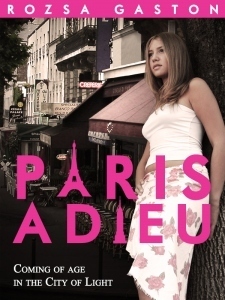
Goodreads Book Giveaway

Paris Adieu
by Rozsa Gaston
Giveaway ends December 16, 2012.
See the giveaway details
at Goodreads.


November 13, 2012
How Ava learned to eat well in France
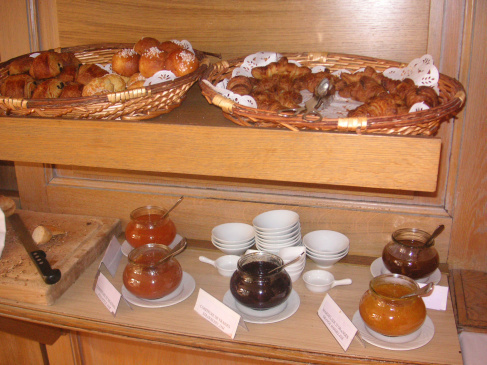 When Ava arrived in Paris at age 19, she couldn’t walk past a pastry shop without going in. Fifteen pounds later, she decided she needed to take control of her food choices. It was a gradual process. Parisian women proved attractive role models to Ava, with their love of pleasure and careful attention to eating small quantities of delicious, high-quality food. They knew something Ava didn’t. It took her ten years to find out. You can find out faster by picking up Paris Adieu http://amzn.to/MLX194 and skipping directly to Chapter Seven.
When Ava arrived in Paris at age 19, she couldn’t walk past a pastry shop without going in. Fifteen pounds later, she decided she needed to take control of her food choices. It was a gradual process. Parisian women proved attractive role models to Ava, with their love of pleasure and careful attention to eating small quantities of delicious, high-quality food. They knew something Ava didn’t. It took her ten years to find out. You can find out faster by picking up Paris Adieu http://amzn.to/MLX194 and skipping directly to Chapter Seven.
Although she admired Parisian women from afar, she couldn’t study them at close quarters, because she didn’t know any. It was Ava’s British girlfriend, Charlotte, whose eating habits tripped the switch that put Ava on the right course to gaining mastery over how she ate and how much. The following scene is excerpted from Paris Adieu (chapter seven, beginning on p. 114):
We took our coffee at the counter, where Pascal introduced me to a new custom. I’d often wondered why eggs were 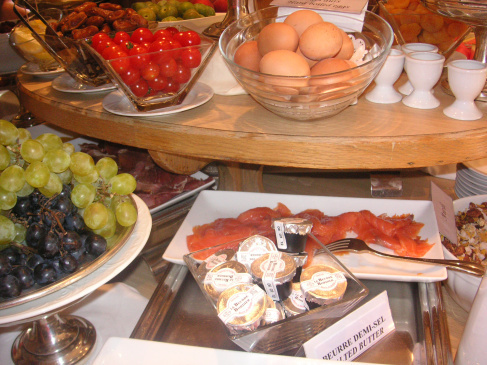 displayed on a vertical stand on Parisian café counter tops, especially in the mornings. Now, I watched as he plucked three eggs from the stand, peeled, and salted one then handed it to me. The hard-boiled egg was fresh and delicious.
displayed on a vertical stand on Parisian café counter tops, especially in the mornings. Now, I watched as he plucked three eggs from the stand, peeled, and salted one then handed it to me. The hard-boiled egg was fresh and delicious.
My English girlfriend, Charlotte, came to mind. I’d met her in Tokyo, where I taught English the summer between sophomore and junior years. She was ten years older, wildly sophisticated, with a penchant for black American Japanese major league baseball players; a male genre which enjoyed superstar status in Japan. Pretty, tall, and willowy, her complexion was as delicate as an English rain shower.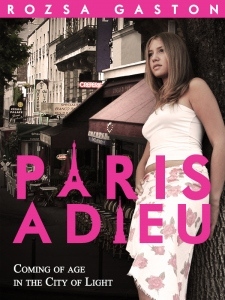
Her eating habits had been as carefully controlled as her love life had not. She was discipline personified. I’d soaked up everything she did, worshiping at the altar of her self-control. Every morning, she’d eat either one hard-boiled or soft-boiled egg with a piece of unbuttered whole wheat toast. She’d wash this down with a few cups of tea. I never saw her vary from this routine once. After we’d parted ways in Tokyo, she came to Yale one spring to visit me. At breakfast in the chaos of my residential college dining hall, surrounded by undergraduates wolfing down doughnuts, bowls of granola, plates of pancakes, eggs and bacon, she maintained her strict regimen by carefully unpeeling her hard-boiled egg and toasting her lone piece of bread. My girlfriends and I were in awe.
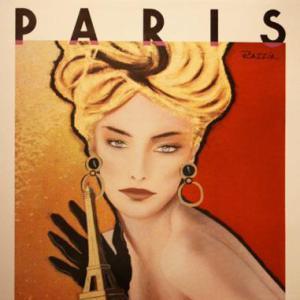 A good number of the girls in my class were anywhere from five to fifteen pounds overweight, except for the ones who were anorexic, bulimic, or naturally slim. My female colleagues and I sucked in our breaths as Charlotte rose from the table after breakfasting, her stomach flat, hip bones jutting out fashionably under her thin, flowered dress, with long slim legs ending in ankles you could wrap your fingers around. Everything about her showed us up. After dark, she was capable of drinking like a fish, another British character trait my Yale colleagues and I found impressive.
A good number of the girls in my class were anywhere from five to fifteen pounds overweight, except for the ones who were anorexic, bulimic, or naturally slim. My female colleagues and I sucked in our breaths as Charlotte rose from the table after breakfasting, her stomach flat, hip bones jutting out fashionably under her thin, flowered dress, with long slim legs ending in ankles you could wrap your fingers around. Everything about her showed us up. After dark, she was capable of drinking like a fish, another British character trait my Yale colleagues and I found impressive.
As I stood at the counter, enjoying my salted, hard-boiled egg, I connected up the dots. Pascal was showing me how to do something Charlotte had known how to do her entire adult life: carefully control her blood sugar in the morning so she didn’t become enslaved to it for the rest of the day.
Finishing the egg, I washed it down with strong coffee with foaming milk in it. Suddenly the display case of flaky croissants farther down the counter had no power over me. If the counterman had slid it down to my end, taken off the top, and wafted the tray under my nose, I wouldn’t have flinched. My one hard-boiled egg with coffee was enough. For the first time in my life, I felt like a Frenchwoman.
Excerpted from Paris Adieu (2012) by Rozsa Gaston at http://amzn.to/MLX194


May 16, 2012
Paris Adieu Book Club Discussion Questions
 1. Is Ava’s character believable? Can you relate to her? In what ways does she remind you of yourself or someone you know?
1. Is Ava’s character believable? Can you relate to her? In what ways does she remind you of yourself or someone you know?
2. Ava’s first French boyfriend Jean-Michel advises her to be comfortable in her skin – bien dans sa peau. What does this mean? How does it differ from self-love?
3. How does Ava’s character evolve from beginning to end of the story? Which events were turning points for her?
 4. What does Ava’s motto “fake it till you make it” mean for you? How is this consistent with her quest for authenticity, and if so, how?
4. What does Ava’s motto “fake it till you make it” mean for you? How is this consistent with her quest for authenticity, and if so, how?
5. What is your take on the French concept of jolie laide, i.e., a woman who is not a beauty by conventional standards but comes across as one (Chapter Three)? Do you buy it? Was there ever anyone in your life who struck you as a jolie laide? What celebrity or historical figure most represents a jolie laide?
6. How does the French ideal of female beauty differ from the American one?
7. In Chapter Three, Ava’s French boyfriend Jean-Michel says “Men don’t fall in love with a woman who is perfect. They fall in love with a woman who is specific. A woman who is comfortable with herself can be herself specifically. She is free to explore who she is, because she is not comparing herself to other women all the time, trying to be someone she’s not.” True or not? Discuss.
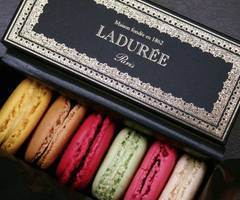 8. Ava arrives in Paris addicted to junk food. Her appetite is regulated not by how full her stomach is but how raging her desire for sweets is. By the end of three extended stays in Paris, she is no longer a slave to sugar and fat. What changed? How did Ava make food choices at the end of the story that differed from the way she made them at the start?
8. Ava arrives in Paris addicted to junk food. Her appetite is regulated not by how full her stomach is but how raging her desire for sweets is. By the end of three extended stays in Paris, she is no longer a slave to sugar and fat. What changed? How did Ava make food choices at the end of the story that differed from the way she made them at the start?
9. In Chapter Seven, Pascal hands Ava a hard-boiled egg to eat for breakfast at the counter of a workman’s cafe. It’s a watershed moment for Ava. Why?
 10. “The whole point of having sex appeal wasn’t really about making men happy. It was about making myself happy. Who knew?” (Chapter Eight). Do you agree? Which popular culture icons do you think have true sex appeal? Which historical figures do you think had true sex appeal? Why?
10. “The whole point of having sex appeal wasn’t really about making men happy. It was about making myself happy. Who knew?” (Chapter Eight). Do you agree? Which popular culture icons do you think have true sex appeal? Which historical figures do you think had true sex appeal? Why?
11. “Being here now never seemed quite enough in New York. In Paris, it did.”(Chapter Ten). Do you agree? How does Ava’s time in Paris help her learn how to live in the present moment?
12. “Have you ever been in love with someone who didn’t love you back?” Sam asks Ava. (Chapter Thirteen). Have you? If so, what did you do about it?
13. Sam describes Paris as the Queen of Diamonds (Chapter Thirteen). What does he mean? Do you agree?
14. ” ‘Be here now’ was what Arnaud preached to Ava. But Pierre practiced it” (Chapter Fifteen). What’s the difference between the two men? Which one, if either, is right for Ava? Which one, if either, would be right for you?
15. Which actress do you see playing the role of Ava?


March 12, 2012
“Fashion fades, style remains the same.” – Coco Chanel
Interview with ‘Paris Adieu’ Rozsa Gaston + Giveaway
We welcome today Rozsa Gaston, author of the women’s contemporary fiction, Paris Adieu. Rozsa is giving away a copy of her book (see details below interview)!
Rozsa Gaston is an author who writes serious books on playful matters. She is the author of Paris Adieu, Dogsitters, Budapest Romance, Lyric, Running from Love and the soon to be released Paris Adieu sequel, Black is Not a Color Unless Worn By a Blonde. Rozsa studied European intellectual history at Yale, and then received her master’s degree in international affairs from Columbia. In between Rozsa worked as a singer/pianist all over the world. She currently lives in Connecticut with her family.
The first time Ava Fodor visits Paris as a nineteen-year old au pair, her French boyfriend introduces her to the concept of being comfortable in her own skin. If only she knew how…
One Ivy League degree later, she’s back for an encounter with a Frenchman that awakens her to womanhood. If only she could stay….
Five years later, Ava returns to Paris as a singer/pianist. She falls for Arnaud, whose frequent travel tortures her. While he’s away, a surprising stranger helps Ava on her journey to self-discovery. Armed with the lessons Paris has taught her, she bids adieu to Arnaud, Pierre and her very first love – the City of Light.
In Paris Adieu, Rozsa Gaston draws readers into the story (and inner thoughts) of nineteen-year old, Ava, a New Englander who struggles with a severe case of “lack-of-planitis” and the constant criticism of an unsympathetic grandmother. Much to her grandmothers’ dismay, Ava recently left college and works part time at a gas station. That is, until she hatches a plan to work as an au pair in Paris. With vivid detail and humor, Gaston takes readers straight into the heart of Paris through the eyes and ears of Ava, to a seductive land, where we smell pastries from her favorite bakery and meander through famous parks and museums, where we meet the French lover who urges Ava, always self-conscious about her body, to feel comfortable in her own skin. Throughout, Gaston writes with a deep appreciation for sensuality that will keep readers attentive to Ava’s every adventure.
Q: Thank you so much for this interview, Rozsa. Can you tell us where you are from?
West Hartford, Connecticut.
Q: How did you come up with the title?
I had another title to begin with, Queen of Diamonds Loves Me Not. It referred to my main character’s largely one-sided love affair with Paris. But my editor told me it was rubbish, then another editor at a large publishing house said the same thing. I scuttled it and came up with a shorter title.
Paris Adieu says what it means. “Adieu” means “goodbye forever” in French. It’s not the typical French goodbye,“au revoir,” which means “see you again.” At the end of Paris Adieu, my main character Ava Fodor makes a decision to leave Paris. She’s learned how to be fabulous there, and when she isn’t, she’s learned how to fake it till she makes it. But now it’s time to take her act back to New York, where she belongs.
Q: They say you can judge a book by its cover. Can you tell us a little about your cover and who designed it?
Rob Mohan, a book cover designer my agent, Sharon Belcastro of Belcastro Agency, found, came up with the cover. He captured perfectly the innocence, slight chubbiness and fledgling thirst for romantic adventure of my main character, Ava Fodor. The first moment I looked at it, I loved it.
I was expecting a long back and forth between my agent and I, going on for months, during which time we’d have all sorts of disagreements over the how the cover should look. Instead, Rob Mohan nailed it right away. He further refined the title’s lettering by adding the Eiffel Tower and Empire State Building images so that the reader knows immediately the story is not just about Paris, but leads back to New York. The color scheme of hot pink with shades of gray perfectly captures the journey Ava makes from black and white, Puritan-inflected New England, where she grew up, to Paris’ shades of gray, accented with Ava’s hot pink readiness to embrace life.
Q: Can you tell us something about your book that would make me run out and buy it?
There’s lots of sex in it, all from a woman’s point of view. I didn’t mean for this to happen, but Paris Adieu is a coming of age tale and my main character matures from age nineteen to twenty nine in the story. It came with the territory.
Q: Are there any messages in this book that you want the reader to know about?
Yes, two.
Accept who you are and be comfortable in your own skin.
Fake it till you make it, if you’re on your way to being comfortable in your own skin, but not there yet. You’ll get there if you keep practicing the discipline of acting like the person you wish to become.
Q: What was your most favorite chapter to write and why?
My favorite chapter to write was the one where Ava’s French boyfriend Jean-Michel’s ex-girlfriend from California returns to Paris for a brief visit and Ava realizes that she and April have far more in common with each other than either of them do with Jean-Michel. They’re both a bit plump, both on diets, both struggling to get their arms around the very Parisian concept of being comfortable in their own skins. When Ava witnesses Jean-Michel trying to sabotage April’s efforts to stay on her diet when they all go out, she gets wise to Jean-Michel’s controlling ways. After April’s visit, Ava has Jean-Michel’s number — and it’s up.
Q: Why did you feel you had to write this book?
My time in Paris in my twenties was utterly magical. It marked me for life and upped the quills in my quiver. I wanted to share what I learned there with other women. How to be comfortable in one’s own skin, and how to seek authenticity in all things, above all, sexual satisfaction. The second derives from the first. Both are like a hammer on a nail’s head. You’ll know when you hit your mark.
Q: Now, some fun questions – What deep dark secret would you like to share with us?
Darlings, secrets aren’t meant to be shared. The really secret ones, I mean. Those are the ones that give a woman mystique, a certain “je ne sais quoi” or “I don’t know what…”
Q: If you could travel anywhere in the world, where would it be and why?
I’d travel to Carcassonne, France. Years ago I experienced a déjà vu while visiting that medieval walled town in the South of France. I felt as if I’d been a blind nun there in perhaps the twelfth century, who played the harp at sunset every evening in a small square that overlooked the valley to the west of the town. This probably has some foundation in books I read about Eleanor of Aquitaine when I was a child, a historical figure who strongly impressed me as a beautiful and powerful figure. I’d like to return to Carcassonne and see if I feel that same tingle of recognition again.
I’m also strongly taken by The Lady and the Unicorn tapestries which hang in the Cluny Museum in Paris. There’s something about France in the middle ages that resonates with me. A copy of the Cluny tapestry depicted here, Le Toucher or Sense of Touch from the “A mon seul désir” series, hangs in my living room. It’s a picture of my soul. I’d love to spend some time wandering around the French countryside gathering the golden threads that weave together the tapestry of that French woman I once was. A future book, perhaps?
Q: Are you a morning person or a night person?
I used to be a night owl when I was a professional musician. As a singer/pianist, I’d typically work from 8 pm – midnight, go to a club to unwind with some dancing afterward, then go home to sleep around 2 – 3 a.m. Some nights we went to afterhours clubs to unwind from the dance clubs. Those days are long gone.
Now I’m a morning person, a cauldron of creativity from 8 am to 1 pm, sometimes 2. Then I go out for a run and prepare for the 3 pm weekday disgorgement of the progeny from the school bus.
Q: Are there any members in your family who also like to write?
My husband writes frequent op-ed articles for our local newspaper. Fortunately, he sticks to non-fiction so we don’t compete. If he wrote fiction, I’d be worried, because he’s an excellent writer. As much as I find his high-level command of syntax annoying, especially when he uses words or phrases I don’t know, it is deeply gratifying to be married to someone who can hold his own at just about any cocktail party.
Q: As a child, were you a dreamer?
Yes. I was a dreamer and a bookworm, raised by my grandparents as an only child.
Q: Last but not least, the magic genie has granted you one wish. What would that be?
That my eleven-year-old daughter would realize her dream of one day becoming a pediatrician.
Q: Thank you so much for this interview! Do you have any final words?
Stay playful. It’s a good way to be.
http://literarilyspeaking.net/2012/03...


March 5, 2012
“Fake it till you make it.” – Ava Fodor from Paris Adieu
The Paris Adieu Hot Tub Interview took place on Mar. 4, 2012 in Greenwich, CT. Hats off to William Gaston, interviewer. Marvelous job, cheri!


February 29, 2012
“Paris is always a good idea.” – Audrey Hepburn
 Move over Fifty Shades. Paris Adieu has arrived. Please join me on my blog tour, Mar. 5-23, 2012. http://www.pumpupyourbook.com/2012/02...
Move over Fifty Shades. Paris Adieu has arrived. Please join me on my blog tour, Mar. 5-23, 2012. http://www.pumpupyourbook.com/2012/02...


January 26, 2012
Slouching toward fabulous, friends.
Kris Wampler, author of “Love
Train” available on amazon.com
http://www.amazon.com/dp/B005X3G3PK
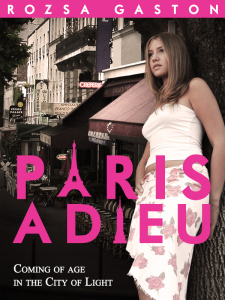 Rozsa Gaston approaches her writing with energy and a love for life. She has also invested time in a unique marketing technique involving bookmarks and reverse psychology, and she shares some of her ideas here.
Rozsa Gaston approaches her writing with energy and a love for life. She has also invested time in a unique marketing technique involving bookmarks and reverse psychology, and she shares some of her ideas here.
1. Tell me briefly about your books – what are they about and what motivated you to write them?
They’re about self-discovery and self-acceptance. Paris Adieu, my latest book, has two themes: 1) how to be comfortable in your own skin and 2) how to fake it till you make it. Paris Adieu’s heroine, Ava Fodor, is clueless about both at the start of the book. By the end, she’s figured out a thing or two – thanks to the insights living in Paris has given her. Ava studies French women, French food, French attitude – while French men study her. By the end of Paris Adieu, she’s more or less transformed herself into the woman she wants to be. And if she hasn’t entirely, at least she’s learned how to fake it till she makes it. But where to take her act? Back to New York, of course, where Ava grasps that her newfound sense of self will work for her in a way it never will if she stays in Paris. After all, she’s not French. What she is, is fabulous. I’m still working on both themes.
2. How have your sales been?
Slouching toward fabulous, darling. Why do you think I’m doing this interview?
3. Have you sought a traditional publisher?
I have and will continue to seek one. In the meantime, I want to spend my time writing books, and sharing with like-minded people in cyberspace – which means all over the world – instead of sending out query letters that never get a response. No interaction dulls my interest.
An artist in Australia commented on my Fine Wines Fine Quotes blog the other day. What a rush that was! Last week, a man in New Delhi, India, liked my quote on Rabindranath Tagore (Who’s that?, you may ask. Go to my blog, Fine Wines Fine Quotes, and find out.) Within seconds of going live with my very first blog post (on Elizabeth Taylor), a visual artist in Arizona commented in a rich, thought-provoking way. Now that’s interaction! Tiny confession: I’m a bit like Paris Adieu’s heroine, Ava. I love travel, I love adventure, and I love meeting new people and receiving new ideas from them. You can do all that in cyberspace. Do any of us know how truly big the adventure of reaching out in cyberspace is? The world is our oyster, friends.
4. You’re relatively new to self-publishing. How have you liked it so far?
It’s driving me crazy. However, my sister-in-law published with one of the giants of traditional publishing houses a few years ago, and her experience with them drove her crazy. So, what’s the difference? At least I had the final say on Paris Adieu’s cover design (perfect), title (genius) and how it’s being presented to the universe (with flair, I would hope).
5. What sort of marketing techniques have you used to sell your books, and which ones have been most successful?
My number one marketing technique to sell Paris Adieu is to entice then deny. Make a note, ladies.
My number two marketing technique is to hand out my Paris Adieu bookmark with its heroine, the mysterious Ava Fodor on the cover and count how many seconds it takes for male recipients to ask “Who’s the girl on the cover?” I thank my male book cover designer, Rob Mohan, for coming up with a cover that perfectly captures the mystique and charm of Paris Adieu’s main character. After the men ask this question, I say “that’s the main character and by the way, do not read this book. It’s meant for women only. Just gift it to a woman you love or know or would love to know.” This has the effect of making them want to read Paris Adieu themselves since they’re already hooked by the image of the woman on the cover. Believe me, the story of Ava Fodor is even better.
Paris Adieu came out December 16, 2011. On that day I sent a group e-mail to members of my running club, telling them about the book and suggesting they buy it for themselves or a friend for Christmas. However, I mentioned that the book is geared toward women, so men should gift female friends with it, definitely not read it themselves. Turns out quite a few of my running club members received e-readers for Christmas and bought Paris Adieu as their very first e-book. Three reviews of the thirteen posted on Amazon.com are from men and differed sharply from reviews from female readers. I’m fascinated to discover how contrastingly men and women enjoy Paris Adieu’ s message. Can’t wait to hear from more male reviewers!
My female running club friends are all buzzing about the book. Whenever one of them mentions it, I tell them in a somewhat loud stage whisper to absolutely not let any male members of our club read it. In fact, I tell any woman I’m talking to about the book, to absolutely not allow her husband or any male family members to read Paris Adieu. This has had the stimulating effect of piquing the interest of many males within earshot. Last week I went to a party where I was surprised to hear that the husband of my girlfriend was religiously reading Paris Adieu on his e-reader every evening and had told his wife he was gaining an education. This has potential. Any ideas on where to go with this?
6. Are there any marketing techniques you intentionally avoided or discontinued, and if so, why?
I have exhausted my interest in handing the Paris Adieu bookmark to friends and asking them to buy the book. You can only do that once, then it becomes boring. In fact, with the amount of solicitations people receive daily, it’s already too annoying to do even once. However, Paris Adieu is decidedly not a boring story, so I’m planning to change my line to something like “Here’s a trip to Paris,” and hand them the bookmark. To men, I might say “Here’s a trip to Paris with my friend, Ava.” Ask me again in a few months if this is working.
7. What’s the most important thing you’ve learned about self-publishing that you didn’t know when you started out?
That it has become, in an extraordinarily short period of time, an acceptable way to publish a book.
We are on the crest of the wave of change. This is a watershed moment in the publishing world. Today’s on-line self-publishers are the front line participants in a historical moment for the publishing industry and for book readers everywhere – the moment when book sales shift predominantly to electronic sales from print sales. Even I can’t quite get my arms around it, but it’s happening!
8. If you could do one thing differently in publishing your books, what would it be?
The one thing I would do differently is to bring out my next book, Grey Dress, Black Belt in print as well as electronic format.
I would like to see all my books come out in print, because many older people would enjoy reading them, yet they haven’t quite figured out how to use e-readers and frankly, don’t want to.
My grandfather used to tell me about how his mother refused to use the telephone when it was first introduced in their home. She was tired of having to learn to adapt to new technology, so she refused to do it. Who can blame her? Why should older people or non-e-reading type people be left out of the frankly fabulous experience of reading Paris Adieu? Let us hope that it comes out in print sometime soon. When Grey Dress, Black Belt comes out, I want Rob Mohan to design the cover, which will be even more ooh la la than Paris Adieu’s cover.
9. Independent authors face the obvious challenge of marketing their books without the resources of traditional publishers. What advice do you have for an indie author just starting out?
Be diligent. If you reserve four hours a day to write, then use one of them to run around on-line, expanding your cyberspace platform. It’s fun! You can use a stunning gravatar of yourself and make yourself look even more fabulous than you already do. You can present yourself as anyone you want to be. In fact, you can fake it till you make it. Read Paris Adieu to find out more.
10. What projects are you currently working on?
I’m rocking and rolling on the sequel to Paris Adieu. It’s called Grey Dress, Black Belt and it’s about what happens to Ava when she leaves Paris to return to New York and a job at the United Nations. There she befriends a dreamy Romanian, as well as two Serbian brothers who are avoiding the draft back home. The title is a play on Rebecca West’s 1941 book on the Balkans, Black Lamb, Grey Falcon. Ava’s discovery that the U.N. is a great place to work, for entirely unexpected reasons, will make readers laugh, want to cry, then laugh some more.
11. If you could market your brand – not just one particular book, but your overall brand of writing – in one sentence, what would it be?
Stay playful. It’s my motto, it’s my brand.
12. How can readers learn more about your books?
Please visit my blogs:1) parisadieu.com, where you can find out more about Paris Adieu and read some tantalizing tidbits from its sequel, Grey Dress, Black Belt, about Ava’s continuing adventures back in New York in the company of her new Balkan friends. Grey Dress, Black Belt coming soon in 2012!
2) finewinesfinequotes.com. On this blog, I post a quote by a historical figure each week, then an excerpt from one of my books, along with a wine recommendation. There you will learn what really happened when Ernest Hemingway fell out with Gertrude Stein, why Edouard Manet said black is not a color and what Elizabeth Taylor didn’t pretend to be, among other gourmet reflections. Your comments and wine suggestions, please.
Finally, get a copy of Paris Adieu on Amazon, Barnes & Noble or Smashwords. If you’re a man, do not read it. I repeat – don’t read Paris Adieu – it will be way over your head. Just gift it to a woman you’re trying to impress and see what happens….


January 5, 2012
“Pink is the navy blue of India.” – Diana Vreeland
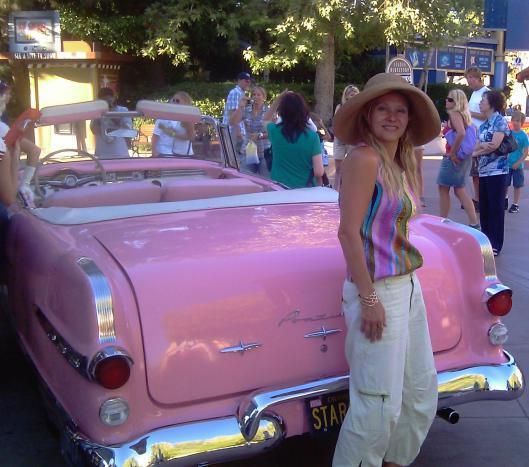
Rozsa thinks pink at Universal Studios, Burbank, CA
My new year’s resolution for 2012 is to think pink. What’s yours?
To kick off my new year’s resolution, I took the family to see Pinkalicious the Musical by Victoria Kann and Elizabeth Kann. It’s the story of Pinkalicious, who can’t stop eating pink cupcakes, despite warnings from her parents. Her pink indulgence lands her at the doctor’s office with Pinkititis, an affliction that turns her pink from head to toe – a dream come true for this pink enthusiast. But when her hue goes to far, only Pinkalicious can figure out how to get out of her predicament! Now playing at the Manhattan Movement & Arts Center, 248 W. 60th St., next to Lincoln Center in Manhattan.http://www.pinkaliciousthemusical.com/
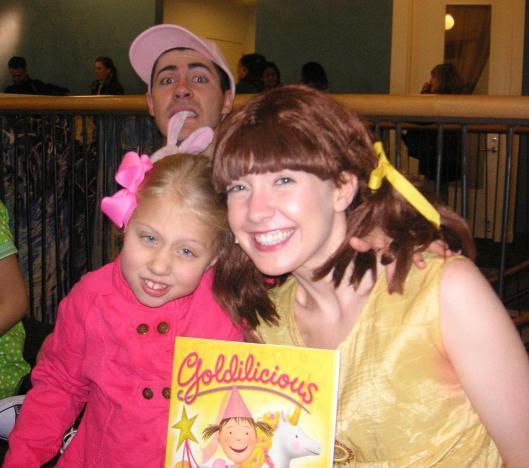 For me, the most important line in the play was when Pinkalicious’s mom sings to her “Life isn’t always fair. You get what you get and you don’t get upset.” That line sang to me as I noticed my eleven year old daughter next to me, taking it in. She knows about getting what you get even when what you get isn’t fair. My job is to help her handle what she’s got like the princess she is.
For me, the most important line in the play was when Pinkalicious’s mom sings to her “Life isn’t always fair. You get what you get and you don’t get upset.” That line sang to me as I noticed my eleven year old daughter next to me, taking it in. She knows about getting what you get even when what you get isn’t fair. My job is to help her handle what she’s got like the princess she is.
Go see Pinkalicious the Musical. It’s a fun story with a serious message. Like my coming of age tale, Paris Adieu, now out on amazon.com and barnes and noble.com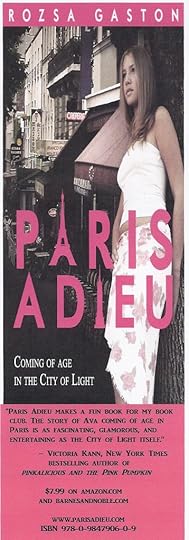 .
.
And think about thinking pink this year. It will help you get through the moments when life seems unfair.
Hugs and kisses to all the princes and princesses out there,
Rozsa
PINKALICIOUS THE MUSICAL
Manhattan Movement & Arts Center
248 West 60th Street
New York NY
212 579-0528
http://www.pinkaliciousthemusical.com/



